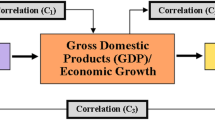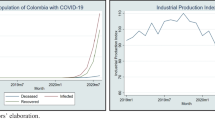Abstract
We use a panel dataset containing the Consumer Price Indices (CPI) of different specifications over 52 major cities of Japan from 2016 to 2020 to investigate whether the COVID-19 pandemic outbreak offset the effort of 2% inflation targeting. Using difference-in-difference method, we find that the pandemic led to price decrease in most necessity items. This could be owed to a number of factors that contribute to both supply and demand shock, such as unemployment, decline in working hours, change in productivity, and personal financial conditions. The trend is more significant in cities outside the capital region, with more confirmed cases, with lower income, having higher mobility restrictions, higher unemployment rate, and higher urbanization level. It is still necessary to learn about the long-term impact of COVID-19 on inflation levels in various social contexts.
Access this chapter
Tax calculation will be finalised at checkout
Purchases are for personal use only
Similar content being viewed by others
References
Carlsson-Szlezak, P.: What coronavirus could mean for the global economy. Harv. Bus. Rev. 3(2020), 1–10 (2020)
Brodeur, A., Gray, D., Islam, A., Bhuiyan, S.: A literature review of the economics of COVID-19. J. Econ. Surv. 35(4), 1007–1044 (2021). https://doi.org/10.1111/joes.12423
Ludvigson, S.C., Ma, S., Ng, S.: Covid19 and the macroeconomic effects of costly disasters. NBER Working Paper No. 26987. National Bureau of Economic Research,Cambridge, MA (2020)
Baker, S.R., Bloom, N., Davis, S.J., Terry, S.J.: COVID-induced economic uncertainty. NBER Working Paper No. 26983. National Bureau of Economic Research. Cambridge, MA (2020)
Fukuda, S., Soma, N.: Inflation target and anchor of inflation forecasts in Japan. J. Jpn. Int. Econ. 52, 154–170 (2019)
Ehrmann, M.: Targeting inflation from below: how do inflation expectations behave? Int. J. Cent. Bank Can. 11(4), 213–249 (2015)
Christensen, J.H.E., Spiegel, M.M.: COVID-19 fiscal expansion and inflation expectations in Japan. FRBSF Econ. Lett. 2022(20), 1–5 (2022)
Congressional Budget Office, Potential Influenza Pandemic: Possible Macroeconomic Effects and Policy Issues (2006)
Fang, Y., Nie, Y., Penny, M.: Transmission dynamics of the COVID-19 outbreak and effectiveness of government interventions: a data-driven analysis. J. Med. Virol. 92(6), 645–659 (2020)
Tanaka, T., Okamoto, S.: Increase in suicide following an initial decline during the COVID-19 pandemic in Japan. Nat. Hum. Behav. 5(2), 229–238 (2021)
Bertrand, M., Duflo, E., Mullainathan, S.: How much should we trust differences-in-differences estimates?. Q. J. Econ. 119(1), 249−275 (2004)
Bechtel, M.M., Hainmueller, J.: How lasting is voter gratitude? an analysis of the short and long-term electoral returns to beneficial policy. Am. J. Polit. Sci. 55(4), 852–868 (2011)
He, X., et al.: Temporal dynamics in viral shedding and transmissibility of COVID-19. Nat. Med. 26(5), 672–675 (2020)
Cavallo, A.: Inflation with Covid Consumption Baskets. NBER Working Paper No.27352. National Bureau of Economic Research, Cambridge, MA (2020)
Guerrieri, V, Lorenzoni, G., Straub, L., Werning, I.: Macroeconomic implications of COVID-19: can negative supply shocks cause demand shortages?. Am. Econ. Rev. 112(5), 1437−1474 (2022)
Jinjarak, Y., Ahmed, R., Nair-Desai, S., Xin, W., Aizenman, J.: NBER Working Paper No. 27185. National Bureau of Economic Research, Cambridge, MA (2020)
Author information
Authors and Affiliations
Corresponding author
Editor information
Editors and Affiliations
Rights and permissions
Copyright information
© 2023 The Author(s), under exclusive license to Springer Nature Singapore Pte Ltd.
About this paper
Cite this paper
Chen, K. (2023). Measuring COVID-19’s Shock to Economy: Evidence from Japan’s Inflation Rate. In: Dang, C.T., Cifuentes-Faura, J., Li, X. (eds) Proceedings of the 2nd International Conference on Business and Policy Studies. CONF-BPS 2023. Applied Economics and Policy Studies. Springer, Singapore. https://doi.org/10.1007/978-981-99-6441-3_109
Download citation
DOI: https://doi.org/10.1007/978-981-99-6441-3_109
Published:
Publisher Name: Springer, Singapore
Print ISBN: 978-981-99-6440-6
Online ISBN: 978-981-99-6441-3
eBook Packages: Political Science and International StudiesPolitical Science and International Studies (R0)




